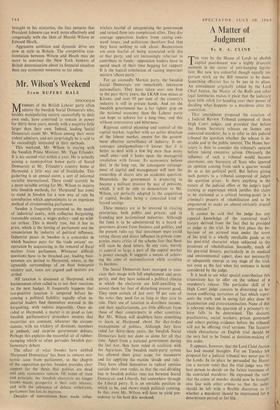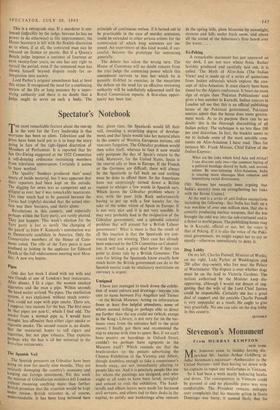A Matter of Judgment
By R. A. CLINE
THE vote by the House of Lords to abolish capital punishment was a highly dramatic moment in the career of anti-hanging legisla- tion. But now less colourful though equally im- portant work on the Bill remains to be done. Something effective has to be put in its place. An amendment originaq tabled by the Lord Chief Justice, the Master of the Rolls and other legal luminaries makes it plain that the judiciary have little relish for handing over their power of deciding what happens to a murderer after his conviction.
That amendment proposed the creation of a Judicial Review Tribunal composed of three High Court judges, and provided that before the Home Secretary releases on licence any convicted murderer, he is to refer to this judicial tribunal the question whether the release is de- sirable and in the public interest. The Home Sec- retary is then to consider the tribunal's opinion before taking executive action. Obviously the influence of such a tribunal would become enormous; any Secretary of State who ignored an opinion coming from such a quarter would do so' at his political peril. But before giving such powers to a tribunal composed of judges the question arises: Is there anything in the nature of the judicial office or the judge's legal training or experience which justifies this claim to be stationed at a critical turning-point in a criminal's process of rehabilitation and to be empowered to make an almost certainly crucial intervention?
It cannot be said that the judge has any especial knowledge of the convicted man's history derived from the fact that he presided as judge at the trial. In the first place the be- haviour of an accused man under the stress of his trial is a wholly unreliable guide as to his post-trial character when subjected to the processes. of rehabilitation. Secondly, much of his pre-trial history., particularly in its medical and environmental aspect, does not necessarily or adequately emerge at any stage of the trial, not even at the last when his sentence is being considered by the judge.
It is hard to see what special contribution this triumvirate has to offer on the subject of a murderer's release. The particular skill of a High Court judge consists in discerning as be- tween conflicting narratives of fact which repre- sents the truth, and in seeing fair play done in examination and cross-examination. None of this is relevant when the question of a prisoner's re- lease falls to be determined. The doctors, psychiatrists, social workers, prison governors and others putting evidence before the tribunal will not be offering rival versions. The features which characterise an English trial should be .the very last to be found at decision-making of this order.
It appears, however, that the Lord Chief Justice
has had second thoughts. For on Tuesday his proposal for a judicial tribunal was never put to the Lords. In its place he persuaded the House (on a narrow vote) that the trial judge was the best person to decide on the future treatment of the convicted murderer. He expressed the view that the crime of murder should now be brought into line with other crimes so that the judge should be left with a flexible discretion as 10 whether a murderer -should be imprisoned for a determinate period or for life.
This is a retrograde step. If a murderer is sen- tenced (inflexibly by the judge, because he has no Power to do otherwise) to life imprisonment, the Home Secretary is left with the flexible discretion as to when, if at all, the convicted man can be released on licence or parole. But if a Queen's Bench judge imposes a sentence of fourteen or even twenty-four years, no one has any right to curtail the period, even if the sentenced man has shown himself beyond dispute ready for re- integration into society.
Lord Parker's original amendment had at least this virtue. It recognised the need for a continuing review of the life or long sentence by a super- vising authority and there is no doubt that a Judge ought to serve on such a body. The principle of continuous review, if it turned out to be practicable in the case of murder sentences, could be extended to other serious crimes for the commission of which long sentences are im- posed. An experiment of this kind would, if suc- cessful, become the prototype for sentencing generally.
The debate has taken the wrong turn. The House of Commons will no doubt remove from the trial judge the sentencing power which this amendment entrusts to him but which he is patently ill-fitted to exercise; in the meantime the debate on the need for an effective reviewing authority will be indefinitely adjourned until the Royal Commission reports. A first-class oppor- tunity has been lost.





























 Previous page
Previous page